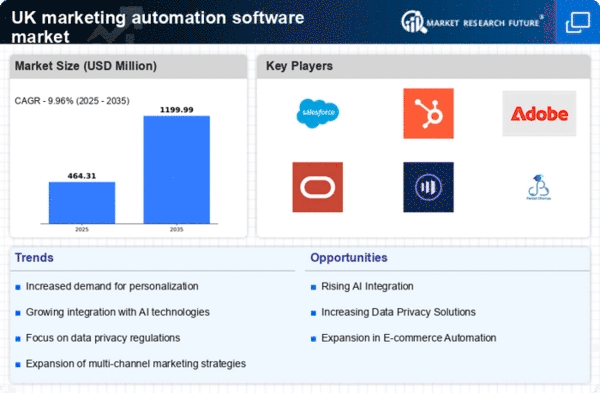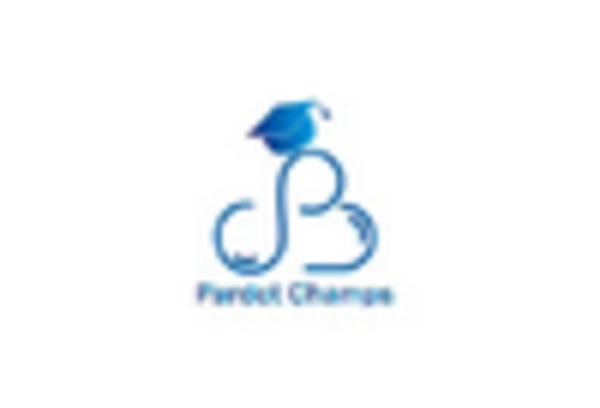Rising Demand for Efficiency
The marketing automation-software market is experiencing a notable surge in demand for efficiency among businesses in the UK. Companies are increasingly seeking solutions that streamline marketing processes, reduce manual tasks, and enhance productivity. According to recent data, approximately 70% of UK businesses report that automation tools have significantly improved their operational efficiency. This trend is driven by the need to allocate resources more effectively and to respond swiftly to market changes. As competition intensifies, firms are compelled to adopt marketing automation software to maintain a competitive edge. The ability to automate repetitive tasks allows marketing teams to focus on strategic initiatives, thereby fostering innovation and creativity. Consequently, the rising demand for efficiency is a critical driver shaping the marketing automation-software market, as organizations strive to optimize their marketing efforts and achieve better results.
Emphasis on Customer Experience
In the marketing automation-software market, there is a pronounced emphasis on enhancing customer experience. UK businesses are increasingly recognizing that personalized and timely communication is essential for customer retention and satisfaction. Data suggests that companies that prioritize customer experience see a 20% increase in customer loyalty. As a result, marketing automation tools that facilitate personalized messaging and targeted campaigns are in high demand. These solutions enable businesses to analyze customer behavior and preferences, allowing for tailored marketing strategies that resonate with their audience. The focus on customer experience not only drives sales but also fosters long-term relationships, making it a crucial driver in the marketing automation-software market. Organizations that invest in these technologies are likely to gain a competitive advantage in an increasingly customer-centric marketplace.
Integration of Advanced Analytics
The integration of advanced analytics into marketing automation software is transforming the landscape of the marketing automation-software market. UK businesses are increasingly leveraging data analytics to gain insights into customer behavior and campaign performance. Approximately 75% of marketers in the UK believe that data-driven decision-making enhances their marketing strategies. This trend highlights the necessity for automation tools that incorporate robust analytics capabilities, enabling organizations to track key performance indicators and optimize their marketing efforts. By utilizing advanced analytics, businesses can identify trends, forecast outcomes, and make informed decisions that drive growth. The integration of these capabilities is likely to become a standard expectation among users, positioning it as a vital driver in the marketing automation-software market.
Growth of Digital Marketing Channels
The proliferation of digital marketing channels is a pivotal factor influencing the marketing automation-software market in the UK. With the increasing reliance on online platforms for customer engagement, businesses are compelled to adopt automation solutions that can effectively manage multiple channels. Recent statistics indicate that over 60% of UK marketers utilize at least three digital channels to reach their audience. This diversification necessitates sophisticated tools that can integrate and analyze data across various platforms, ensuring a cohesive marketing strategy. As companies seek to enhance their online presence and improve customer interactions, the demand for marketing automation software that supports multi-channel campaigns is likely to grow. This trend underscores the importance of adapting to the evolving digital landscape, making it a significant driver in the marketing automation-software market.
Regulatory Compliance and Data Security
Regulatory compliance and data security are increasingly becoming paramount in the marketing automation-software market. With the introduction of stringent data protection regulations in the UK, businesses are compelled to adopt solutions that ensure compliance while safeguarding customer information. Recent surveys indicate that over 80% of UK marketers express concerns regarding data privacy and security. As a result, marketing automation software that incorporates robust security features and compliance tools is in high demand. Companies are seeking solutions that not only streamline their marketing processes but also protect sensitive data from breaches and unauthorized access. This focus on regulatory compliance and data security is likely to shape the future of the marketing automation-software market, as organizations prioritize trust and transparency in their customer interactions.
















